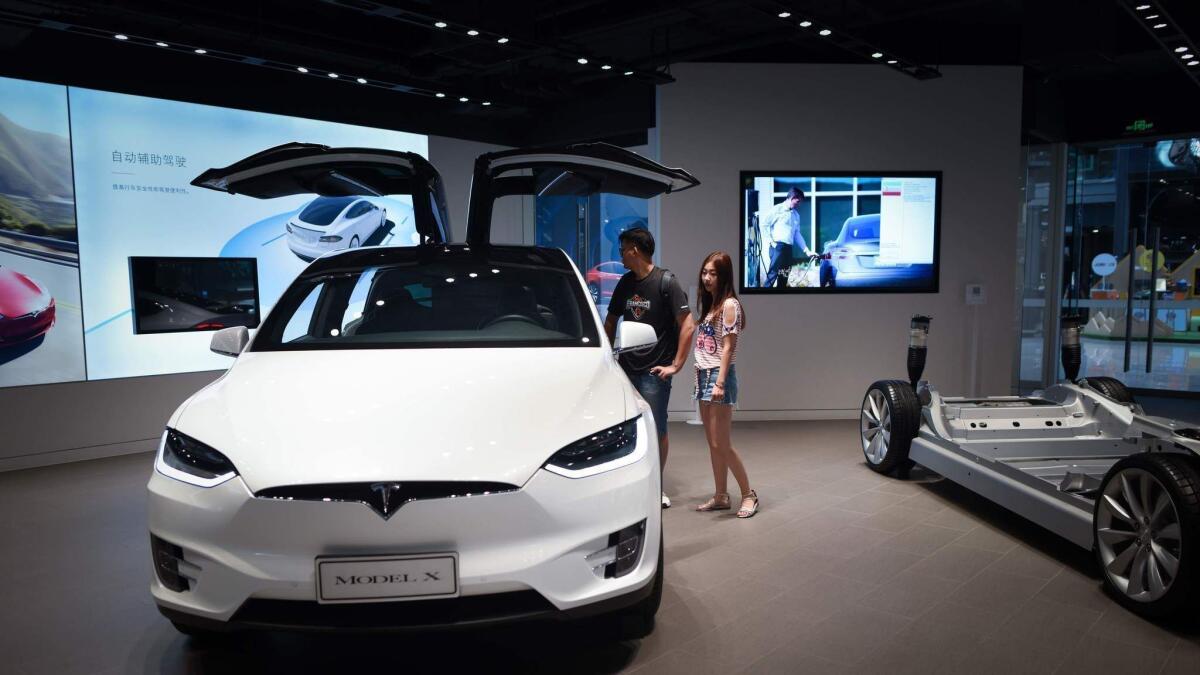Senior aides push back on Trump’s claim that China agreed to cut auto tariffs

- Share via
Reporting from Washington — President Trump’s top economic advisors pushed back Monday on his claim that China has agreed to eliminate tariffs on U.S. auto imports, saying no such agreement had been struck.
The unusual dispute was the latest to suggest that Trump’s handshake agreement on trade during a working dinner Saturday night in Argentina with Chinese President Xi Jinping remains open to divergent interpretation, even in the White House.
On Sunday night, after returning to the White House from the Group of 20 economic summit in Argentina, Trump declared on Twitter that China “has agreed to reduce and remove tariffs on cars coming into China from the U.S.”
If true, that would mark an achievement for the White House because the Chinese tariff is 40%. It caused auto stocks to jump Monday as part of a broad stock market gain based on the pause in the U.S.-China trade war.
But Trump’s top economic advisors made clear Monday that no agreement to reduce and remove the tariffs yet existed, despite Trump’s boast.
“We don’t yet have a specific agreement on that, but I will just tell you … we expect those tariffs to go to zero,” Larry Kudlow, Trump’s top economic advisor, told reporters in a conference call from the White House.
Chinese officials did not confirm any agreement.
China had reduced the tariff to 15% on July 1 for car imports from all nations. But several days later, it boosted it to 40% for U.S. imports in response to tariffs the Trump administration had levied in the tit-for-tat trade dispute.
U.S. companies sold about $10.2 billion worth of passenger vehicles in China in 2017, according to the Commerce Department. The U.S. tariff on auto imports from China is 27.5%.
Trump touted his working dinner with Xi, after the G-20 summit in Buenos Aires, as an “extraordinary” meeting that could bring about “massive and very positive change, on trade and far beyond.”
“Relations with China have taken a BIG leap forward!” Trump tweeted. “Very good things will happen. We are dealing from great strength, but China likewise has much to gain if and when a deal is completed. Level the field!”
Other than Trump’s agreement to delay any new tariffs for 90 days, however, officials from the two economic superpowers offered different interpretations of what the two leaders promised at the table.
Treasury Secretary Steven T. Mnuchin gave mixed messages, appearing to confirm the auto tariff cut but then backing off.
“There is an immediate focus on reducing auto tariffs,” Mnuchin told reporters. “There’s a lot of work to be done over the next 90 days.”
White House trade advisor Peter Navarro also wouldn’t confirm China was lifting auto tariffs. He told NPR that the issue “certainly came up in discussions” between Trump and Xi.
“That’s just one of the many tariffs that have to be reduced,” Navarro said.
Kudlow said he believed that China had committed to reduce the auto tariffs.
“That is my understanding, that is President Trump’s understanding and hopefully we’ll see some quote unquote immediate action there,” Kudlow said.
Pressed on how low the auto tariffs would go, Kudlow would not give a number but said he expected them to disappear eventually.
Robert Lighthizer, the U.S. trade representative, will lead the negotiations with China on auto tariffs and other trade issues during the 90-day truce, Kudlow said. Kudlow told reporters twice on the call that the 90 days would begin on Jan. 1, but the White House later corrected him to say the period began on Dec. 1.
The two nations are “pretty close” to some agreements on China’s alleged theft of U.S. intellectual property and policies that force U.S. companies to transfer technology to Beijing in order to do business in China, he said.
“We’re going to move very fast,” Kudlow said.
Trump had threatened to increase U.S. tariffs to 25% from 10% on $200 billion in Chinese imports, starting on Jan 1. He temporarily pushed the deadline back after Xi said China would purchase more U.S. agricultural and energy products to help ease the trade imbalance.
China acknowledged that but neither side provided any details or timeline, so it was difficult to know if the deal marked a breakthrough or not.
Kudlow said the Trump administration would watch China closely to make sure it lives up to its commitments.
“We’ve been down this road before historically and the story has always been disappointing. Stuff that they said would get done doesn’t get done,” Kudlow said.
“I’m not questioning them right now, but the history has not been great,” he added. “We have a lot of things to do, a lot of hurdles.”
Twitter: @JimPuzzanghera
UPDATES:
4:10 p.m.: The article was updated with the White House correcting Larry Kudlow to say the 90-day trade truce with China began on Dec. 1.
The article originally was published at 12 p.m.
More to Read
Inside the business of entertainment
The Wide Shot brings you news, analysis and insights on everything from streaming wars to production — and what it all means for the future.
You may occasionally receive promotional content from the Los Angeles Times.











